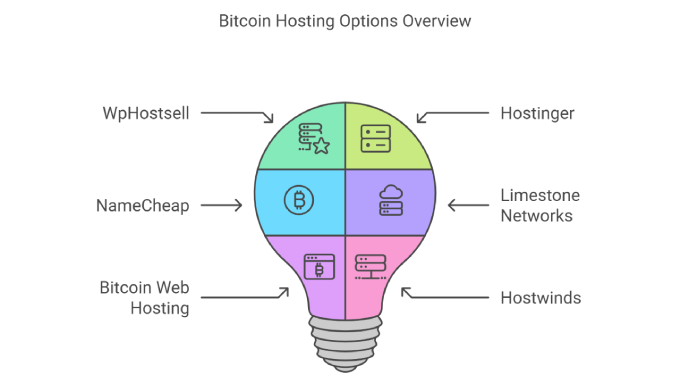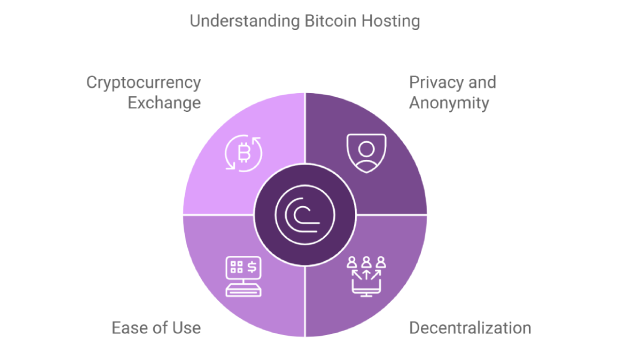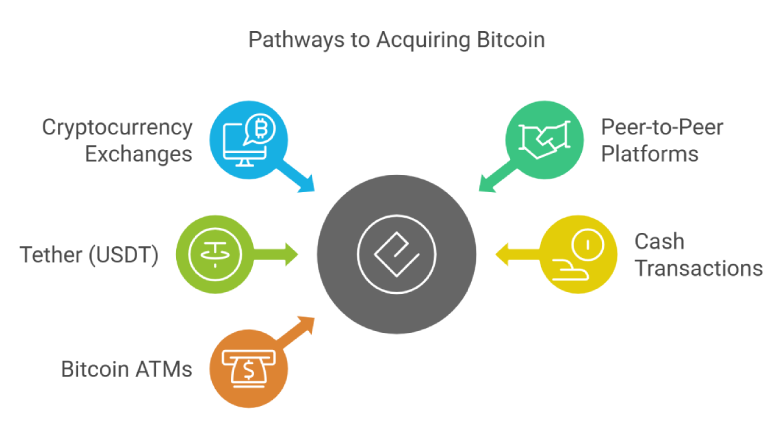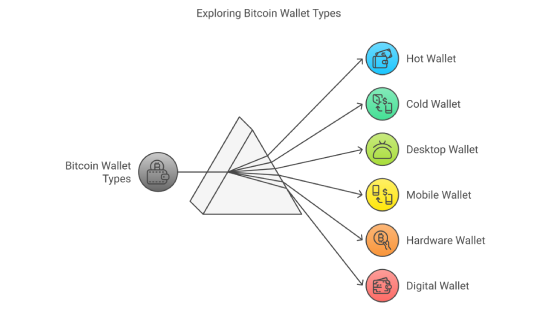In today’s digital age, cryptocurrency is transforming how we manage finances, including online transactions for essential services like web hosting. Bitcoin hosting, which allows you to pay for web hosting using Bitcoin or other cryptocurrencies, is gaining popularity for its privacy, speed, and ease of use. Whether you’re a crypto enthusiast, privacy-conscious user, or simply looking for a hassle-free payment alternative, Bitcoin hosting provides a unique way to power your website without relying on traditional banking. In this guide, we’ll explore the benefits, options, and what to look for when choosing the best Bitcoin hosting provider to suit your needs.
Table of Contents
Compare Bitcoin Hosting
Bitcoin is digital open-source money that can be utilized for nameless or low-cost transactions. Website homeowners can now use Bitcoin to buy web hosting providers together with domain identity registration. However, you can now easily buy Bitcoin hosting easily
Look for a bunch with sturdy safety and privacy protections. It’s greatest to decide on a longtime web host with robust fame.
We go into extra elements about Bitcoin hosts. Here are the highest 5 Bitcoin web hosts:
- WpHostsell – Best & low-cost, trusted hosting accepting bitcoin
- Hostinger – quick hosting accepting bitcoin
- NameCheap
- Limestone Networks
- Bitcoin Web Hosting
- Hostwinds
How Did We Rank The Best Hosts For Bitcoin?
We vetted Bitcoin hosts on fame, velocity, efficiency, uptime, and technical help. Then, we factored in thousands of consumer critiques from our hosting database. Buy Cpanel with Bitcoin from a cheap web hosting company.
Compare Bitcoin Hosting Plans
|
#1
|
Single Site Hosting plan
|
(36) |
BDT67.60 / mo |
|
#9
|
Web Hosting plan
|
(10) |
BDT671.45 / mo |
VodaHost »
|
What Is Bitcoin Hosting?
Bitcoin hosting allows users to pay for web hosting services using cryptocurrency, especially appealing to those valuing privacy and anonymity. Many Bitcoin enthusiasts and tech-savvy users prefer this payment method for its privacy, as transactions on the Bitcoin blockchain are pseudonymous, making it harder to trace personal details than traditional payment methods. Bitcoin was designed as a cryptographic peer-to-peer network to decentralize belief amongst community members.
Bitcoin’s ease of use is a major draw for hosting clients who prefer not to use credit cards or PayPal. Bitcoin transactions don’t require intermediaries, providing a straightforward, decentralized alternative for those seeking efficient, cash-free payment solutions. Some hosting providers also offer seamless Bitcoin payment integrations, making it simpler for users to accept Bitcoin payments on their websites. Last but not least, exchanging various cryptocurrencies for Bitcoin is lifelessly easy.
A Brief History Of Bitcoin
Launched in 2009 by the anonymous Satoshi Nakamoto, Bitcoin operates on a decentralized, public ledger called the blockchain. While all transactions are recorded publicly, the identities of senders and recipients remain private, adding a level of confidentiality without full anonymity.
Privacy And Anonymity In Bitcoin Transactions
Bitcoin’s decentralized nature makes it more private than traditional payment methods, though not entirely anonymous. Bitcoin’s blockchain has inspired the development of advanced blockchain applications, known as “Bitcoin 2.0” and “Bitcoin 3.0,” pushing the limits of privacy and functionality across digital transactions.
Bitcoin’s Competitors In The Crypto Space
Bitcoin is no longer the only major cryptocurrency. Alternatives like Ethereum, Cardano, and Ripple have gained prominence, each offering unique features and contributing to a growing blockchain ecosystem. These platforms are more than just currencies—they are innovative systems enabling new hosting possibilities and decentralized solutions.
With Bitcoin’s popularity soaring, there are now multiple ways to purchase it. From traditional exchanges to peer-to-peer platforms, each method offers unique benefits. Here’s a look at the main ways to turn your cash into Bitcoin. Should you resolve to need to transfer your funds, the capacity to have the ability to accomplish that immediately is vital. Many customers of Bitcoin under-rate this high quality when choosing pockets.
1. Buying Bitcoin Through Exchanges
One of the fastest and most straightforward ways to buy Bitcoin is through established cryptocurrency exchanges like Coinbase or Kraken. These platforms offer an easy-to-use interface and provide various options to purchase Bitcoin. To get started, users must create an account and complete verification, usually by submitting personal identification and proof of address. Once verified, you can fund your account through bank transfers or wire deposits. While convenient, this option can come with fees of up to 4%, depending on the exchange.
2. Peer-To-Peer (P2P) Platforms
Peer-to-peer platforms like LocalBitcoins connect buyers and sellers directly, often at lower fees than exchanges. P2P platforms offer the flexibility to choose from multiple payment methods, and users are rated based on past transactions, helping to build trust. While P2P can be more affordable, it’s essential to choose reputable sellers carefully. An escrow system ensures funds are protected, but always exercise caution and verify the seller’s ratings and reviews. Digital wallets principally come in the form of web pockets. These may be accessed by way of a URL, alternatively as a browser plugin.
3. Using Tether (USDT) To Buy Bitcoin
Tether (USDT) is a stablecoin pegged to the U.S. dollar, making it a popular tool for trading into Bitcoin. USDT is available on major exchanges like Binance, Bitfinex, and Bittrex and offers an easy way to buy Bitcoin without the volatility of fiat currency. Many traders use Tether as an intermediary for a seamless and quick exchange to Bitcoin, often at competitive rates. By holding Tether, you can make rapid purchases whenever prices are favorable.
4. Buying Bitcoin With Cash
For those willing to navigate some risks, cash transactions offer a straightforward, peer-to-peer option to buy Bitcoin. Depending on local supply and demand, buying Bitcoin with cash can sometimes yield better rates. However, caution is essential: always verify the seller’s Bitcoin balance and meet in a secure, public location to ensure safety.
5. Bitcoin ATMs
Bitcoin ATMs provide a convenient way to buy Bitcoin using cash. These machines are increasingly available in cities worldwide, allowing users to purchase Bitcoin by inserting cash and receiving BTC directly into their wallets. Although Bitcoin ATMs charge higher fees than most other methods, they offer a quick and easy way to acquire Bitcoin, particularly for those without access to online banking.
Bitcoin Hosting vs. Bitcoin ATM: Which Is Right For You?
Bitcoin ATMs have become a popular way for the everyday user to buy Bitcoin, thanks to their ease of use and growing availability. Found in many major cities across the US, UK, and other leading economies, these ATMs offer the convenience of purchasing Bitcoin with cash or a bank card. However, keep in mind that transaction fees vary widely depending on the machine’s owner, often resulting in high costs. While Bitcoin ATMs are handy in emergencies, they may not be the most economical option for regular purchases.
Exchanging Other Cryptocurrencies: A Flexible Alternative
For users who frequently deal with multiple cryptocurrencies, holding other coins, such as Ether, can offer added flexibility. Storing funds as Ether or another cryptocurrency allows for easier transfers between wallets, often with lower transaction fees than Bitcoin. Once you’re ready to convert to Bitcoin, most exchanges enable a quick and seamless transaction, typically within two minutes. This approach is especially useful for those looking to manage various crypto assets efficiently.
Moving Bitcoin Securely: The Role Of Wallet Types
The convenience of a wallet matters just as much as its security, especially when transferring funds. There are seven main types of Bitcoin wallets, each offering different qualities:
- Hot Wallet: Always connected to the internet, hot wallets offer quick access but come with higher security risks.
- Cold Wallet: Ideal for long-term storage, cold wallets remain offline, making them safer from cyber threats.
- Desktop Wallet: Accessible from your home computer, desktop wallets are user-friendly but are becoming less popular over time.
- Mobile Wallet: Known for speed and ease of use, mobile wallets are great for frequent transactions, though they sometimes suffer from bugs.
- Hardware Wallet: The most secure choice, hardware wallets (like Ledger and Trezor) are physical devices that store Bitcoin offline, recommended for long-term holding.
- Digital Wallet: Similar to mobile wallets, digital wallets are convenient for payments but less suited for long-term storage.
Each wallet type has unique benefits, so selecting the right one depends on your storage needs and transaction frequency.
Hot Wallets vs. Cold Wallets: Understanding The Basics
Hot wallets are connected to the internet, offering convenience for frequent transactions. However, this online access also increases vulnerability to cyber threats. On the other hand, cold wallets, which remain offline, are highly secure and ideal for long-term storage. By understanding these differences, you can choose a wallet that best suits your needs for Bitcoin security and accessibility.
Using Bitcoin Wallets For Hosting Payments
While mobile and digital wallets offer ease of access for regular transactions, they may not be the best option for storing large amounts of Bitcoin long-term. However, for paying bills, including hosting services, digital wallets are quick and effective. For long-term storage, consider using hardware or cold wallets to ensure maximum security.
1. Understanding Bitcoin Mining And The Role Of Miners
Bitcoin mining is essential for maintaining the Bitcoin network, performed by “miners” using specialized equipment. Miners validate transactions by solving complex cryptographic puzzles, earning new Bitcoins as a reward. This process, however, requires high computing power and electricity, meaning that industrial-scale operations dominate mining today. For most individuals, the costs of mining—like hardware and energy—make it challenging to profit. Despite this, mining remains a core component of Bitcoin’s decentralized system. In the early days, bitcoin may very well be mined utilizing commonplace CPUs and GPUs, however, as a result of “hash rate,” that is not the case.
2. How Cloud Mining Makes Mining Accessible
For those interested in mining without the expense of hardware, cloud mining offers an alternative. In cloud mining, users buy contracts to lease mining power from a remote company. This option reduces the need for personal equipment and energy expenses, while still allowing users to earn small dividends. Cloud mining typically comes in two forms: hosted mining, where you lease a dedicated Bitcoin miner, and leased hashing power, where you rent a specific amount of processing power. Cloud mining is a simpler way to experience Bitcoin mining, though returns can vary based on market conditions and provider policies.
3. Beyond Currency: Practical Uses Of Cryptocurrencies
Bitcoin has evolved from a niche digital currency to a widely recognized asset with diverse applications. Apart from online payments, Bitcoin and other cryptocurrencies are used in crowdfunding models like Initial Coin Offerings (ICOs). ICOs allow projects to raise funds by distributing tokens to contributors, who in turn gain proportional voting rights or access to the product. With over 1,400 cryptocurrencies, each supporting unique products or services, the flexibility and decentralized nature of these assets have made them popular in both crowdfunding and investment.
4. Leveraging Cryptocurrencies For Payments
Cryptocurrencies like Bitcoin are increasingly used for transactions, especially for online payments. While Bitcoin is popular, transaction fees and slower confirmation times can be obstacles for businesses that need quick and cost-effective payments. To accept Bitcoin payments on an e-commerce site, businesses can partner with payment processors like BitPay or Coinbase, which manage transactions without requiring the business to hold Bitcoin directly. However, direct payments are also an option for those comfortable managing their funds, although it requires more effort in terms of tracking and administration.
FAQs On (Bitcoin Hosting)
Q1: What is Bitcoin hosting, and how does it work?
A: Bitcoin hosting refers to web hosting services that accept Bitcoin or other cryptocurrencies as payment. Instead of traditional payment methods, you use Bitcoin or another crypto to pay for hosting services, making it ideal for privacy-focused users and crypto enthusiasts.
Q2: Why should I choose hosting that accepts Bitcoin or cryptocurrency?
A: Choosing hosting that accepts Bitcoin offers privacy, faster transactions, and fewer transaction fees. It’s also a convenient option for those who prefer decentralized currencies over traditional payment methods.
Q3: Is Bitcoin hosting secure?
A: Yes, Bitcoin hosting can be secure, especially when using reputable hosting providers. Many providers accepting Bitcoin also focus on privacy and security, implementing strong encryption and data protection measures.
Q4: Can I pay for hosting with other cryptocurrencies besides Bitcoin?
A: Yes, many Bitcoin hosting providers accept a range of cryptocurrencies, including Ethereum, Litecoin, and others. Check with the provider for a list of supported cryptos before purchasing.
Q5: How do I buy Bitcoin hosting with cryptocurrency?
A: To buy Bitcoin hosting, select a provider that accepts cryptocurrency, choose your hosting plan, and complete the payment process with your preferred crypto wallet. The provider will guide you through the steps to ensure a smooth transaction.)
Conclusion
Bitcoin hosting is an ideal solution for those seeking privacy, convenience, and the flexibility to pay with cryptocurrency. With benefits like reduced transaction fees, faster payments, and compatibility with various types of websites, Bitcoin hosting offers a modern alternative to traditional payment methods. By choosing a reliable provider that accepts Bitcoin or other cryptocurrencies, you can streamline your website’s setup while keeping your financial transactions decentralized. Explore the options, consider your specific hosting needs, and make the most of cryptocurrency to power your online presence securely and efficiently.














